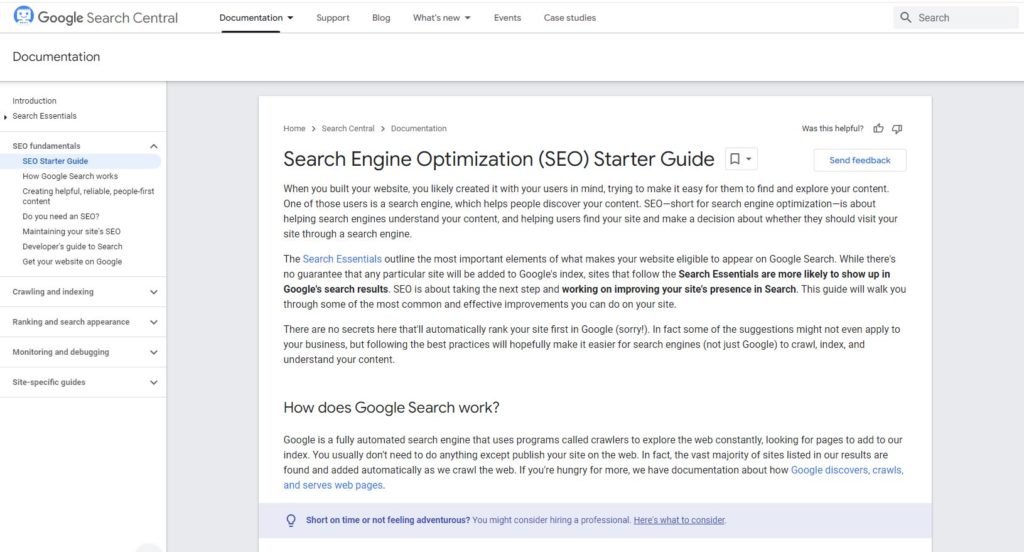When you search the Internet, you will likely get helpful and fresh results matching your keywords. So how does this work? If we think about the plethora of pages to search through on the Internet – or even a single website – the search engine needs to determine which pages to display first in the search results.
How do search engines prioritize which results to show first? Search engines use several algorithms to determine the most helpful web pages to return first in the search results, also called page ranking or search engine ranking.
How are pages ranked in the search results? Page ranking uses a variety of factors to determine the ranking of a web page, which, to mention a few, include:
- understanding the meaning of the user’s search query by recognizing spelling mistakes and synonyms;
- looking for keywords that appear in the content;
- giving more weight to key elements like titles and headings where the keywords appear in the content;
- depending on the nature of your search query, prioritize recent web pages over older ones.
This blog post introduces different ways search engines rank web pages and how search results ranking has come about. We will also look at how AddSearch allows the ranking of search results from the AddSearch dashboard so you can provide the most helpful results to your visitors.
What is search engine ranking?
Before returning search results, search engines crawl web pages and store them in a search index. A search index is a special database optimized for efficient information retrieval using a keyword or keywords.
There are a plethora of pages in the search index – even on a single website. Because of this, there is a need to prioritize which indexed pages are returned first in the search results. Search engine ranking combines different methods to sift through the indexed pages, sort them out and return the most helpful results for the user.
Search engines try to understand what the user is searching for by recognizing misspelled words and synonyms. Synonyms make sure searching with different keywords with the same, or a similar meaning leads to the same search result. For instance, if the user searches for trousers, the search engine may return results for pants and jeans.
When the user searches with a keyword or keywords, a request is made to the search index. What happens then is that the search engine algorithms look for matching keywords from the content of the indexed web pages. In addition, the frequency of these matches matters; the more matches, the higher the page ranks in the search results.
Search engines regard the key elements on web pages as more important. For instance, if the searched keywords appear in the title or headings, they have more weight than those in the body of the web page’s content. Emphasizing titles and headings comes from the hierarchical structure of an HTML document (a web page), where the titles and headings contain the information in a condensed way.
Search engines may also disregard elements with repetitive content from the search. These elements include sidebars, navigation menus (headers), and footers that are usually the same on all web pages. Removing these elements from the search makes the search results more relevant for the user.
Search engine ranking helps to prioritize recent web pages over older ones. This prioritizing depends on the nature of the search, where searching for news topics and announcements renders results from recent web pages, but searching for dictionary definitions, the time of publication isn’t as meaningful.
Optimizing content for better search engine ranking
Web search engines, such as Google and DuckDuckGo, use search algorithms to rank web pages and help users get the most relevant search results for their search queries.
Website owners or others responsible for content on the web pages cannot affect how these algorithms function. To make the web pages rank higher, website owners need to optimize their websites using the rules search engines provide.
Search engines offer guidelines for Search Engine Optimization (SEO). These guidelines instruct how to have web pages indexed, how to structure the content on web pages and websites, and factors that prevent ranking higher in the search results.

In addition, the Internet is full of information about optimizing content, not to mention tools for finding keywords and editing content for better ranking.
While optimizing a website is beneficial, the best way to make pages rank higher in the search results is to provide the most helpful information people are searching for.
Using site search to rank results
As mentioned, to have pages ranked higher in the search results with web search engines, you need to take into account the guidelines and rules. While these guidelines and rules constitute good practice for organizing content on your website, site search solutions, such as AddSearch, allow for adjusting page ranking with a graphical interface or programmatically with an API.
How can you rank pages using AddSearch? AddSearch provides tools to manually manage results and adjust settings that affect specific aspects of the search ranking algorithm.
One of the most prominent tools to manage results manually is the Pinned Results feature. It allows for selecting and organizing search results for a search query, so they are displayed first in the search results.
Unlike Pinned Results, Ranking Tools is a feature set that adjusts the ranking of all web pages in the search index, assuming they are associated with the ranking settings of the AddSearch ranking tool.
Progressive Ranking boosts high-demand search results from the last 30 days. Progressive Ranking helps to rank seasonal services and products higher, where search queries for men’s shoes result in clicking sneakers in the summer and boots in the winter.
Date Boost ranks pages, increasing the importance of recent pages over older ones. It helps to amplify the importance of recent product reviews, announcements, and news articles. With the decay attribute, you can shorten or lengthen the period during which the pages are considered recent. The decay time allows for extending the Date Boost for a series of content, such as reports, that span over a longer period.
While the key elements are ranked higher by default than the body of the text, Field Weights allow for increasing the importance of key elements where the keywords appear in the content. Giving more weight to key elements helps with content where the title and headings contain the topic concisely.
Custom fields are data used to carry extra information such as pricing, star reviews, and other attributes associated with, for instance, a product page. The Custom Fields Boost increases the ranking of the pages that contain the specified custom fields. You can boost pages with five-star reviews or with higher pricing tiers.
Exact Match Boost increases the ranking of exact phrases from the documents that match a search term containing two or more words. It is useful when your customer knows the search term precisely, for instance, a specific phone model, a car spare part, a book title, or a university course.
Conclusion
Page ranking is about determining the importance of the web pages and increasing the ranking of the most important pages. Web search engines require you to optimize your web pages based on their guidelines. While the guidelines provide good practices to organize the content on your web pages, site search solutions provide you with means for increasing the ranking for the most crucial web pages aligned with your business goals.









